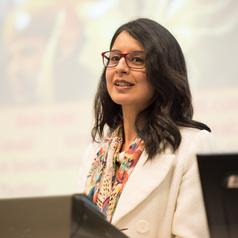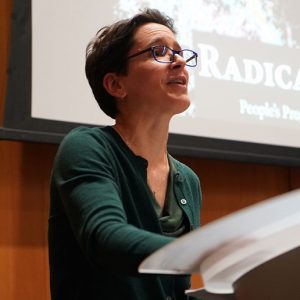Speakers
Keynote speakers

Sukhmani Khorana
Sukhmani Khorana is Associate Professor and Scientia Fellow in the School of Arts and Media at the University of New South Wales (Australia). Previously, she was a Vice Chancellor’s Senior Research Fellow at Western Sydney University. Sukhmani has published extensively on media diversity, multi-platform refugee narratives, and the politics of empathy. She is the author of Mediated Emotions of Migration: Reclaiming Affect for Agency (Bristol University Press, 2022) and The Tastes and Politics of Inter-Cultural Food in Australia (Rowman and Littlefield International, 2018). Sukhmani is a regular contributor to the media and outlets like ‘The Conversation’ on issues of representation and migration in Australia and the Global North.
Abstract of the Keynote Speech:
Belonging as a Reciprocal Affect: Towards Centring Agency in Migrant and Refugee-led Digital Media Artefacts
In this talk, I explicate for ‘belonging’ departs from the emphasis on ‘identity’ and/or integration. ‘Identity’ could be construed as individualistic, whereas ‘belonging’ is inherently relational, and therefore it could be a mediated emotion of social change. In the context of migration, belonging is the affective dimension of citizenship, and thereby enables participation of migrants in a range of social, economic, cultural and political activities. It is also important to understand where belonging is obstructed, and how these obstructions can be overcome. This has particular repercussions for young people in socio-economically disadvantaged areas. How can this be mobilised from an affective state, measured, generated, and re-generated as a transformative feeling for facilitating refugee and migrant agency?
Through the case study of a recent situated migrant community project with a social action research methodology and a digital archival outcome based in South West Sydney, I examine what belonging looks and feels like when the focus is on co-creating cultural safety and facilitating agency through approaches that favour peer reciprocity and care. This lens on belonging also reverses the discursive construction of migrants nd refugees as those requiring integration initiatives to fit in, or of certain others in need of de-radicalisation. Instead, it asks – what will make them feel safe enough to invest in local and national communities and how can ‘rooted’ projects and digital tools enhance this form of belonging? This is not to discount the value of resettlement programs and English-language classes. Rather, it is about augmenting those with projects that decentre the majority community and make space for cultural belonging and to emerge in a reciprocal manner.

Sarah Elwood
Sarah Elwood is professor of Geography at the University of Washington, co-founder of the Relational Poverty Network with Victoria Lawson, and past editor of Progress in Human Geography. Her research focuses on digital technologies, urban geographies, and creative politics forged by structurally disadvantaged peoples fighting for equity, self-determination and everyday thriving against steep odds, making contributions in relational poverty studies, urban and digital geographies, visual politics and mixed methods. She has studied the use of geographic information systems (GIS) by neighborhood groups fighting gentrification and racial dispossession, interactive online mapping by children whose spatial knowledge and agency often go unseen, digital apps used in low-barrier employment by unsheltered people living and working in public space, and visual poverty politics advanced by unsheltered people and their allies. She is co-author of Abolishing Poverty: Toward Pluriverse Politics and Futures (University of Georgia, 2023), co-editor of Relational Poverty Politics (University of Georgia, 2018) and Qualitative GIS (Sage 2009).
Abstract of the Keynote Speech:
Practicing Abundance: Hope, Digital Geographies and the City
In many places, digital mediated urbanism is ubiquitous, violent and unequal, as technocapitalist urban development processes and the platformization of everyday life by public and private actors create sociospatial processes of racialized removal, surveillance, impoverishment, even premature death. Nonetheless, activists confronting these forces of removal through eviction, expensification, illegalization and precaritization are crafting digital tools and tactics that advance sociospatial relations of emplacement, collectivity, accountability, mutuality and thriving. Hope is an animating force underlying these digital praxes that forge material and ideological pathways for staying put and living well, yet ironically, hope is largely absent from the theoretical-epistemological fabric of ‘critical’ social science research on digital cities. Human geographers have studied deployments of digital technologies in urban justice struggles for nearly 3 decades, yet consistently return to a theoretical-epistemological skepticism that prefigures these kinds of digital politics as insufficient: Too small, unlikely to ‘scale’, not sufficiently ‘structural’. I will argue that apprehending hopeful digital geographies requires re-orienting our theoretical repertoires and analytic attentions toward geographies of abundance, a framework that I argue digital geographers can learn from Black and queer feminisms, abolition thought, liberation theologies and other heterodox traditions that refuse material and ideological relations of scarcity and deficit. I develop these arguments with case examples drawn from the Seattle metropolitan area, a site of intensive struggles over urban removals and a wellspring of creative digitally mediated counter-politics by mutual aid, collective action, and solidarity organizations.

Payal Arora
Payal Arora is a digital anthropologist and an author, speaker, and professor. She holds the Chair in Technology, Values, and Global Media Cultures and is an Academic Director in UX and Inclusive Design at Erasmus University Rotterdam. She is the co-founder of FemLab, a feminist future of work initiative. Her expertise lies in user experience of & inclusive design for low-income communities worldwide and comes with two decades of fieldwork experience in such contexts. She is the author of award-winning books including “The Next Billion Users” with Harvard Press (PROSE award Winner for the best 2019 book in Business, Management and Finance). Engadget stated that her Harvard book is one of “the most interesting, thought-provoking books on science and technology we can find.” Forbes named her the “next billion champion” and “the right kind of person to reform tech.” Several international media outlets have covered her work including the BBC, Financial Times, The Economist, Quartz, Tech Crunch, The Boston Globe, F.A.Z, The Nation and CBC. She has consulted on tech innovation for diverse organizations such as Adobe, Spotify, Google, UNESCO, KPMG, GE, UNHCR, and HP. She has given more than 300+ talks in 115 cities in 67 countries including TEDx talks on the future of the internet and frugal innovation. She sits on several boards such as Columbia University’s Earth Institute, World Women Global Council in New York, and the ICRIER Prosus Centre for Internet and Digital Economy. She has held Fellow positions at Bellagio Rockefeller, GE, ZEMKI, ITSRio, MICA, and NYU. She has her international policy degrees from Harvard and Columbia University. She is Indian, Irish, and American and lives in Amsterdam.
Abstract of the Keynote Speech:
Aspirational Geographies and Hopeful AI Futures With The Global South
If we scan mainstream media headlines on the rise of AI, they loudly declare the end is near. An article in The Guardian states that, “The future of AI will fill you with unholy terror.” The Nation declares “The future of AI is war,” while the BBC warns us that, “it could lead us to extinction.” Every act you do and every word you say is up for automation and erasure. Academics, policymakers, and even many technologists appear pessimistic about the future. There are few spaces of solace to ground us to cope with such pessimism.
While legitimate concerns drive these fears, we need to equally account for young people’s digital aspirational geographies to ensure we do not inadvertently destroy that which they value the most—rare spaces for self-actualization. Anyone who has ventured outside the West will feel the contagion of optimism from the ‘next billion users,’ 90 percent of the youths worldwide who reside in the Global South. They hunger for being digital, despite the tremendous socio-political challenges they face. This is survival in its fullest sense. Finding humor when at war has helped people cope. Sharing something beautiful from a place of devastation sustains human dignity. Creating moments of joy, inspiration, and entertainment with digital media feeds into hope for the future. This dual perspective helps us reconcile the solidarities that come out of #MeToo, and #BlackLivesMatter movements with current hashtag hating.
This talk makes the case that the West is suffering from pessimism paralysis—a negative bias towards all things digital—that can derail the drive to change the status quo. Negativity does not inspire change. Pessimism is for those who are privileged and can afford to live with despair. It carves out a way in which we can reimagine the future of AI that is rooted in the manual, the material, and the multicultural, which, if steered in the right direction, can infuse us with hope. It is not naïve to be optimistic about our digital future. It is our moral imperative to design with hope.
